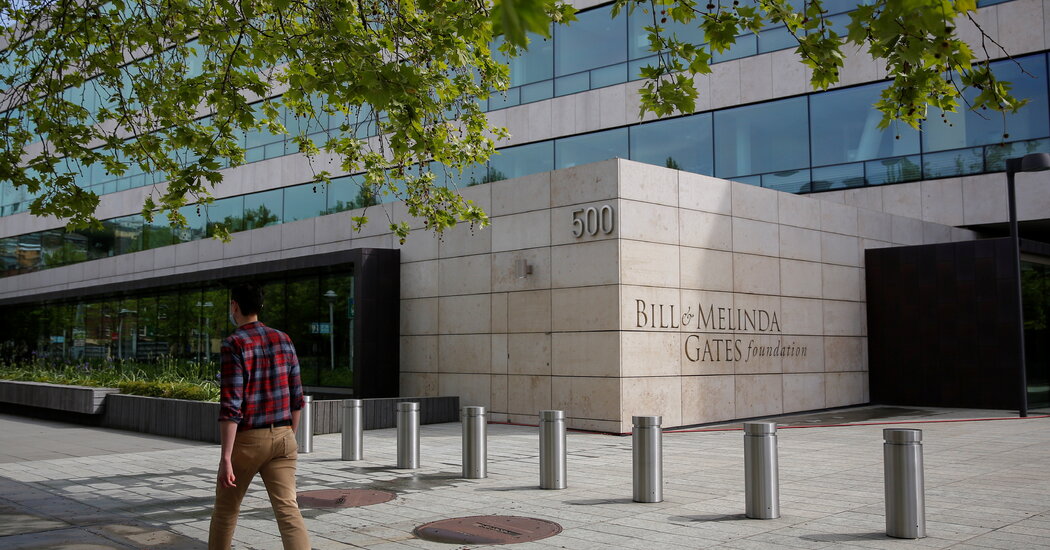When news broke last year that Bill Gates and Melinda French Gates were divorcing, the question quickly arose as to whether their foundation would lose easy access to the founders’ substantial resources.
On Wednesday, the Bill and Melinda Gates Foundation appeared to answer those doubts with the announcement that it will significantly accelerate its donations in areas such as global health, economic development, gender equality and education as the co-founders continue to pump money into what was already by most measures. the largest charitable foundation in the world.
The foundation said it would increase the percentage of its grants from nearly $6 billion a year before the pandemic to $9 billion a year by 2026. To contextualize that $3 billion increase, the Open Society Foundations , funded by George Soros and itself one of the country’s largest philanthropies, reported total spending of $1.4 billion in 2020.
Mr. Gates and Ms. French Gates pledged to inject another $15 billion in funds into the foundation last summer. Mr. Gates said on Wednesday that as part of that commitment, he was donating $20 billion to the foundation this month.
And there’s probably more money where that came from. “Looking to the future, my plan is to give all my wealth to the foundation except what I spend on myself and my family,” wrote Mr. Gates, who has a fortune of $122 billion, according to Forbes. his personal blog, Gates Notes.
“I will go down and eventually disappear from the list of the world’s richest people,” added Mr. Gates, who is reportedly the fourth richest man in the world, although he and Ms. French Gates have been around since 1994. 39 billion to the foundation “Giving this money is not a sacrifice at all. I feel privileged to be involved in tackling these major challenges.”
The foundation also receives an annual gift from investor Warren E. Buffett in the form of shares in his company Berkshire Hathaway. This year’s gift came in last month worth $3.1 billion. All told, Mr. Buffett has given the foundation nearly $36 billion. The foundation estimated the endowment would grow to $70 billion with the new funds.
Gates Foundation CEO Mark Suzman said the foundation would not expand its focus. Rather, it believes the urgency of its existing projects — such as the fight against polio and malaria worldwide and against learning loss in the United States during the Covid-19 pandemic — justifies increased spending.
Mr. Suzman warned that it would not be easy to increase spending effectively. “On that scale, giving is actually incredibly complex, and we learned that the hard way,” he said in an interview.
“We are now actively looking at whether we can and should do more around the food security crisis,” he added.
While the foundation has earned acclaim over the years for its leading role in global philanthropy, it has also been viewed critically for its influence. For example, it is one of the largest donors to the World Health Organization, and in poorer countries, the size of the foundation’s donations means it can, intentionally or unintentionally, set many of the priorities for crucial ministries such as health and education.
Mr Gates wrote on his blog that the increased pace of giving was in response to the many challenges the world currently faces, including the war in Ukraine, the pandemic, rising inflation and climate change.
In a statement, Ms French Gates said: “The foundation has spent more than two decades forging relationships with a wide range of partners with the vision and expertise to accelerate the pace of progress for all. These additional expenses will support the important work of our partners to promote a fair and inclusive recovery and a healthier, more equal future.”
Under federal tax laws, private foundations are required to spend about 5 percent of their endowment annually, which would be about $3.5 billion for the Gates Foundation.
The foundation has undergone significant changes in the past year. Mr Buffett stepped down as one of the three trustees last summer. Mr Gates and Ms French Gates announced that they had agreed that she would leave the foundation if they found they could not work together. In January, the foundation said it was setting up a new board of directors with Mr. Gates, Ms. French Gates, Mr. Suzman and three outsiders.
“At a time when the impulse may be to turn inward, it’s critical that we do the opposite,” one of those new board members, Minouche Shafik, the director of the London School of Economics, said in a statement on Wednesday. “Strengthening our resolve and stepping up our contributions is the only way to reverse these trends.”
Mr Gates added: “The great crises of our time require us all to do more.”

